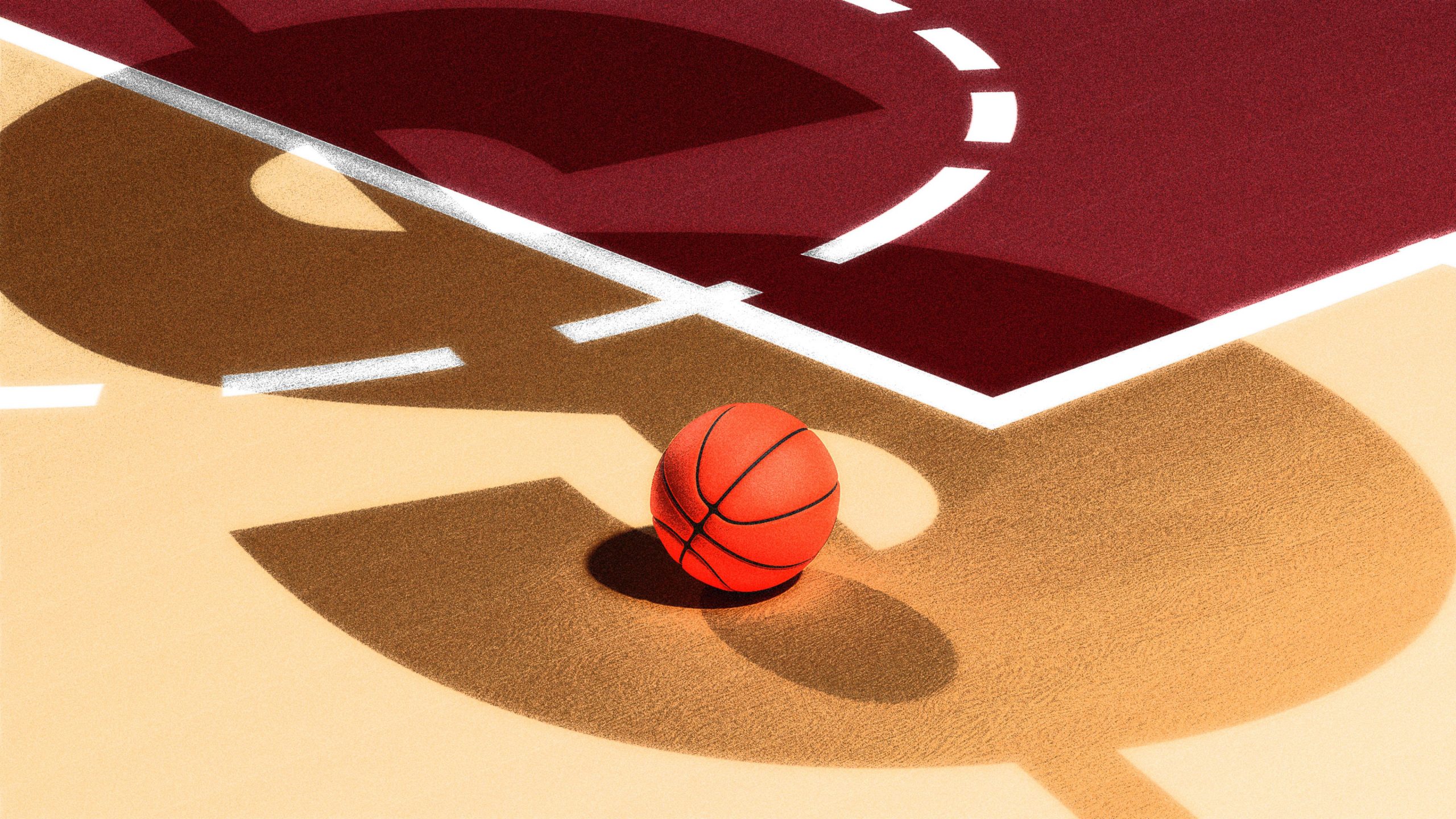It’s only a matter of time before legalized sports betting ruins the game
April 07, 2024
It’s only a matter of time before legalized sports betting ruins the game
The NBA’s Jontay Porter scandal reveals just how bad it can—and will—get as gambling dollars flood into sports.
BY Jay Willis
In 2018, the Supreme Court struck down a decades-old federal ban on sports betting, at last empowering state lawmakers to decide how free their constituents should be to wager their life savings on Jalen Hurts’s first-half rushing total. On the day of the decision, Tulane Law School professor Gabriel Feldman predicted a wave of “gamblization” that would render the American sports landscape unrecognizable. “Fans will become much more focused on gambling than following a team,” he told the New York Times. “It will make every second of every game of every week interesting to fans as it will give everyone something to root for.”
If anything, Feldman’s prognosis was too cautious. Today, betting has become so integral to the fan experience that it’s hard to remember what it was like before, when the industry’s most significant incursion in mainstream sports programming was the occasional cryptic quip about the spread from Al Michaels in the waning moments of Sunday Night Football. Pregame shows now feature talking heads vociferously debating one another’s picks, and broadcast teams fill breaks in the action with helpful updates on live-betting odds from FanDuel and DraftKings. ESPN, the biggest brand in sports media, runs its own sportsbook; so does Fanatics, the sports merchandise behemoth better known for hawking shoddy knit caps. It is impossible to watch a game without suffering through an ad in which a C-list celebrity and a retired athlete offer step-by-step instructions for downloading a casino’s app, promising savvy viewers the power to get rich in just a few well-chosen taps.
By the numbers, the gambling revolution’s impact has been staggering. The handle—the total dollar amount wagered—is approaching $100 billion annually, and by 2026, some analysts think it could hit $20 billion per month. Much of this comes in the form of mobile betting, which means the barrier to entry is now as simple as unlocking a smartphone and thumbing through the lines. “I wish I had a casino gambling hobby,” a man recovering from gambling addiction told Time last year. “You have to leave your house and go to the casino and bet. Now, you can be sitting on the toilet and deposit an infinite amount of money.”
Given the volume of cash that this arrangement dispenses to everyone but the players themselves, it was perhaps inevitable that a scandal involving a player would emerge. Enter Jontay Porter, a backup center for the Toronto Raptors, who has been flagged by the NBA for suspicious activity related to his player props—bets that he’d go over or under a certain number in points, rebounds, or some other statistical category in a given game. On two occasions, one in January and the other in March, Porter exited games early, ostensibly for health-related reasons: an aggravation of an eye injury the first time and an unspecified illness in the second. Since Porter played only four minutes and three minutes, respectively, in these games, the under bets hit by comfortable margins.
As it so happens, on both nights, the under bets on Porter—again, a bench player on a bad team scuffling through a rebuilding season—were among the most profitable wagers across the entire NBA. Most sportsbooks enforce prop limits of a few thousand dollars, but according to ESPN, multiple accounts tried to place five-figure wagers on Porter in the hours before tip-off—numbers that, depending on how the bettor structured their wager, could turn into a six- or even seven-figure payout. Throwing down this much money on the shooting prowess of a guy averaging four-ish points a game is the sort of thing you do only if you have (one) an alarming gambling problem or (two) reason to believe the bet is a sure thing or close to it.
Porter, who has previously dabbled in trading stocks and cryptocurrency, hasn’t played since the story broke in late March, and will remain away from the team while the league looks into these betting irregularities. But Raptors head coach Darko Rajakovic told reporters that he’d never had reason to doubt a player’s “honesty” about injuries, an odd phrasing that seems to suggest that Porter pulled himself from the games in question. All the available evidence indicates that someone, somehow, knew in advance that he’d do so.
Even if there exists some benign explanation, the leagues and their partners have to understand that at this point, a gambling scandal is a matter of when, not if. You don’t have to be an economist to understand the perverse incentives here: There are simply too many players, coaches, doctors, equipment managers, and so on who are watching all this money change hands as a result of their work product. Eventually, someone is going to make a play for their share, if they haven’t already: Porter only got flagged because someone was betting unusual amounts on his performance (or lack thereof), which suggests that others, simply by exercising a little more discipline, could cash in on inside information without being detected.
Part of the challenge of rooting out corruption is the sprawling array of options that sportsbooks offer, which go well beyond the Big Four leagues in the United States. From your living room couch, you can bet on Aussie rules, Gaelic hurling, professional volleyball, and college lacrosse. You can bet on hockey in Sweden and Finland, basketball in Taiwan and Turkey, and handball in Hungary and Poland. You can bet on something called “snooker,” which means that it’s possible to lose money you don’t have on a game with rules you just learned about on Wikipedia. In theory, a compromised player or two on a second-tier soccer team in Scotland is a bona fide money-making opportunity, as long as no one gets greedy and does something stupid. Leagues have tried to build a wall between the on-field product and another multibillion-dollar industry that revolves around it, but there are too many cracks for regulators to find and patch every single one.
The danger is perhaps especially acute in college sports, where money goes first to conferences, schools, administrators, coaches, and broadcast partners, and last to the students who play the games, if there’s anything left. A handful of high-profile college athletes, especially in football and men’s basketball, earn real money from name, image, and likeness deals; but for most of them, cracking a thousand dollars a year is a real accomplishment. Prop bets on individual players, which are available in a handful of states, have the potential to change this calculus in a hurry. Jontay Porter’s 2023-24 salary is about $415,000. How much more tempting must taking a strategic night off be for hypercompetitive 19-year-olds who aren’t cashing NBA game checks, especially when the means for turning beer money into a new car is, in theory, sitting in their pocket?
In March, days after the Porter story broke, NCAA president Charlie Baker called for a nationwide ban on player props in college sports, reasoning that campus “chatter” about who’s sick, who’s sore, and who’s tired “takes on a whole new consequence” in the golden age of mobile betting. A few states have taken this step already. But even if more regulators were to agree, it’s not clear how far they’ll be willing to go to check an industry that is already spiraling out of control. Legalization has been especially devastating for young people who are gambling away paychecks, inheritances, and student loan dollars. In 2022, the first full year Connecticut allowed mobile betting, calls to the state’s gambling helpline increased 91%. Since 2018, calls to New Jersey’s have nearly tripled.
At some point, there are going to be enough embarrassing scandals, patchwork fixes, and ruined lives for the powers that be to take a step back and say, look, maybe this has been a terrible mistake. But, even so, they won’t have much incentive to follow through on it. Congress remains hamstrung by a conservative Supreme Court supermajority whose anti-regulation crusade continues unabated. Cash-strapped states that have grown used to this tax revenue, which totaled half a billion dollars in Q3 2023 across several dozen states, have no reason to surrender their cut. The sportsbooks have $11 billion in cumulative annual revenue to defend, and armies of lobbyists ready to deploy, at the first sign of trouble. Meanwhile, next year, the NBA plans to incorporate live betting into its League Pass platform, eliminating the last sliver of daylight between professional basketball and the ability to wager on it. If you’ll pardon the phrase, the smart money is on same-game parlays becoming more integrated into the consumer experience, not less.
Whenever the Porter investigation concludes, the designated villain is going to get the hammer brought down on them. If Porter placed the bets or tipped off someone who did, expect him to be banned from the NBA, and perhaps to face criminal charges. If it was a team official or employee acting on nonpublic information, expect them to get fired, and their former employer to pay an astronomical fine and forgo first-round draft picks from now until 2037. If it was a CVS clerk who sold DayQuil to Porter the morning of the game, expect them to never be able to log into their DraftKings account again.
Satisfying as these punishments might sound, especially to the league executives and law enforcement officials who solemnly announce them, none of them would do anything to address the real problem: a system that doles out easy money that too many powerful interests have come to depend on. When arrangements like this go wrong, it is easier to blame a single bad apple than it is to acknowledge that in an orchard this big and this profitable, some of the crop is bound to rot.
ABOUT THE AUTHOR
(16)



